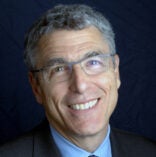Fred LaPolla, a member of Brooklyn Jews, did a Google search a couple of years ago with his fiancé searching for a Jewish community; they were looking for something less formal than a synagogue, oriented toward folks in their late 20s, early 30s. That’s how he found Brooklyn Jews, and found a “fun, laid-back event” and then, more social occasions. “Now it’s in our calendar to go, including High Holy Day services.”
Raised secularly with a Catholic dad and Jewish mom, Fred learned about Shabbat services when the rabbinic intern at Congregation Beth Elohim in Brooklyn, Matt Green, scheduled time to walk people through what happens during Friday night services. (Rabbi Green is now the incoming assistant rabbi at CBE). Now, with marriage upcoming, Fred and his wife-to-be are planning to join CBE, the synagogue that has been sponsoring Brooklyn Jews as a project outside of its traditional walls.
This is just one story among thousands. Over the last year, many previously unconnected young people have searched out our communities because they seek a sense of purpose to anchor their lives at a time in our nation that is fraught with uncertainty. A deeply questioning generation, one that doesn’t easily join synagogues or institutions in general, its members take nothing for granted. They are fluid in their identities and seek out meaning where they can find it.
Given the divisive politics of our time, millennials are also seeking a safe space where they can come together to shape a world in an image that reflects their values, which include pluralism, inclusiveness and a desire to make positive change. Traditional forms of institutions don’t necessarily work for them. We need to help them find the place and the freedom to shape their own Judaism.
Many of our congregations have begun to foster new forms of assembly for a new generation, young adult communities that have flourished and found followings within the constellation of our congregations, but with new models of belonging.
Today, at least 40 congregations across North America are powering these new millennial communities, engaging more than 12,000 Jews. Each group has its own model; but what unifies them is combining prayer with learning and social justice, social activities and a touchstone for building a new home away from home. Governance and what membership entails are left up to the groups themselves. And, importantly, each group has clergy engagement. As important as it is to grow the network so that participants can join a community when they move to a new city, it is equally important for clergy to share best practices. As has already happened, when clergy move from one city to another, they bring this new model with them. For example, Rabbi Matt Soffer helped create Brooklyn Jews as a rabbinic intern at CBE and when he moved to Temple Israel in Boston, he brought his expertise and passion along, too.
Temple Israel’s Riverway Project, named for the congregation’s location in Boston, includes programs in cafés and coffee shops around town, along with their signature monthly Shabbat event, Soul Food Friday. Now, the project is expanding its reach, connecting with Jewish millennials beyond the city in Cambridge, Somerville and Medford.
In only its third year of existence, The Well, sponsored by Temple Israel in West Bloomfield, Mich., has quickly become the go-to Jewish community in Metro Detroit. The Well has grown from one staff person to three full-time staffers and engaged more than 2,000 Jewish millennials last year through a variety of programs.
San Francisco’s Temple Emanu-El’s Young Adult Community, with a leadership team of members in their 20s and 30s, has a waiting list to join. “We have very low barriers to membership for young adults that encourage affiliation,” explains Rabbi Jason Rodich, one of the congregation’s clergy who assists in the program.
This millennial generation is extraordinarily mobile. They study on one part of the continent, settle for a time in another city before moving to a new job or opportunity in a third place.
We need to make sure that no matter where our young people land, they will find welcoming communities that are there for them to join and to help shape. And, due to the mobility of this population, we need to strengthen and expand these communities as a network, so that a person who moves from one city to another can find a new home. That’s why URJ is embarking on connecting the communities through a Millennial Network.
It is simply no exaggeration to say that the future strength and vitality of the North American Jewish community depends on how we engage the millennial generation and those who follow.
Rabbi Rick Jacobs is president of the Union for Reform Judaism.
The New York Jewish Week brings you the stories behind the headlines, keeping you connected to Jewish life in New York. Help sustain the reporting you trust by donating today.





